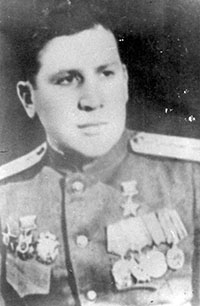Efim Berezovskii was born in 1913 into a poor Jewish family in the town of Savran, Ukraine. At a very early age Efim lost both parents and became a street child. At 10 he began working at a factory in Donbass Region, while at the same time pursing an elementary and then professional education. In 1935 Efim Berezovskii was drafted into the Red Army, serving in an artillery regiment until 1937. In 1938 he began working on the Donetsk railroad, first as an electrician, then as an electrical engineer. In June 1941 he graduated from the Moscow railway school.
After the outbreak of war on June 22, 1941, Berezovskii joined the Red Army. As a commander of the intelligence department of the Artillery Regiment of an infantry division Berezovskii fought on the Briansk Front, taking part in the Moscow counter-offensive. In the same year he received the Order For Valor. In the battle of Stalingrad (August 1942 - February 1943) Lieutenant Berezovskii was the commander of an artillery battery of the Voronezh Front. During the battle for Kursk (July 1943) the battery under his command destroyed several German "Tiger" tanks and inflicted heavy losses on the German troops. In January 1944, for participation in the Second Kiev Offensive (October-November 1943), Efim Berezovskii was awarded the title of Hero of the Soviet Union. The article “Efim Berezovskii, Dnieper [River] Hero” by Major Aron Toker, prepared by Jewish Anti-Fascist Committee apparently in 1944, describes these events. He participated in the liberation of southwest Ukraine and of Romania and ended the war near Vienna. Efim Berezovskii participated in the victory parade on Red Square on June 24, 1945 with troops from the 2nd Ukrainian Front. During the course of the war Berezovskii had also be decorated also with the orders of The Red Banner, The Red Star, and of Alexander Nevsky.
In an interview given in the early 2000s Berezovskii stated that even though he was a Jew, during the war he didn't sense any difference between the soldiers of the various Soviet nationalities.
In 1946, at his request, Berezovskii was demobilized. He returned to help repair the Iasinovataia railroad station, which had been destroyed by the Germans. In 1949 he graduated from the Leningrad Institute of Railway Engineering and then was appointed head of the Signal and Communication Division in Belgorod and, later, in Lozovaia, Kharkov County and, finally in the southern Ukraine. Berezovksii subsequently settled in Moscow, where he was assistant head of the electromechanical factories complex until 1987.
Efim Berezovskii died in Moscow in 2011.
Article about Efim Berezovskii
Excerpt from the article “Efim Berezovskii, Dnieper [River] Hero” by Major Aron Toker prepared by the Jewish Anti-Fascist Committee, apparently in 1944 or 1945, described Berezovskii's deeds during the Dnieper military operation:
"… on one of the most important sectors of the front, between the Desna and Dnieper rivers, Senior Lieutenant Berezovskii, a commander of an artillery battery, successfully and brilliantly carried out an operation not only due to his personal courage and the military skills of his soldiers, but also due to his own initiative. After crossing the Desna River the battery under his command set up a position on the left bank of the Dnieper and opened fire at the enemy positioned on the opposite bank of the river. By constant shelling, the enemy prevented the Soviet infantry from crossing to the right bank of the river. Then Berezovskii quickly organized the transfer of weaponry the right bank without ceasing, even for a minute, to shell the enemy's positions from the cannons that still remained on the left bank. Berezovskii himself moved some [of this] weaponry to the right bank. After he had chosen a good location, he opened fire at the enemy, thus attacking the Germans from two directions. During this operation 250 German officers and soldiers were killed, two guns and five machine-guns destroyed, and five mortar batteries were silenced. This enabled the Soviet troops to cross to the right bank of the river. For this act of bravery Berezovskii was awarded the title of Hero of the Soviet Union."
From: GARF 8114-1-149, copy YVA JM/26137
Interview with Efim Berezovskii
In an interview given in the early 2000s Efim Berezovskii recalled how his artillery unit crossed over to the right bank of the Dnieper:
"North of Kiev is located the village of Liutezh and there my battery and the Infantry battalions were ordered to cross the Dnieper and take a bridgehead in order to broaden it and [subsequently] to liberate Kiev. On September 23, on improvised rafts and the infantry on the fishing boats we [i.e. our artillery] began to cross the Dnieper under enemy fire-mortar shells, and roaring of artillery! We had 4 cannons… but one of our raft with weapons was sunk. Also some infantrymen were drowned [by the Germans]. But [eventually], via bank in hand-to-hand combat we reached the [right]. Together with the infantry we managed to capture a small bridgehead and, during the following 24 hours, we repelled 11 [German] attacks. Around us the ground was literally burning under our feet. … We were the very first division to cross the Dnieper…. Marshal [Georgii] Zhukov [Chief of the General Staff of the Red Army] arrived at the site in order to prepare the offensive for the liberation of Kiev. He was told about my battery, came to see the battery and congratulated me. He shook my hand [and said]: 'Good for you, you can already consider yourself a hero.' [Subsequently] four men of my battery, including myself, were awarded the title of Hero of the Soviet Union."
From: "Efim Berezovskii" by A. Drabkin, first published on December 12, 2007, I Remember, Soviet WWII Veteran-memoirs (Russian/English), last accessed on October 17, 2014







